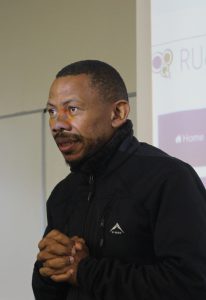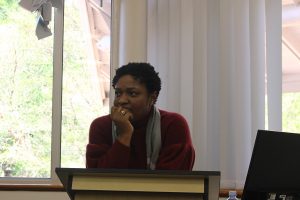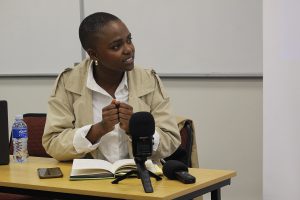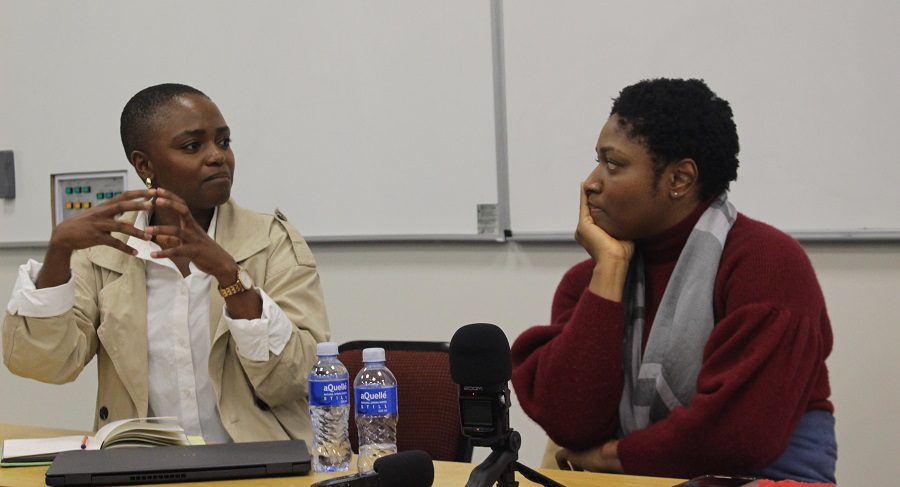By Benny Mojela
The Rhodes University Political and International Studies department hosted a Black Consciousness Colloquium titled “Genealogies, Current Trends, and New Interpretation” on 13 September 2023. There were two speakers and a discussant for each of them. The first speaker was Professor Victoria Collins-Buthelezi, Associate Professor in English and Director of the University of Johannesburg’s Centre for the Study of Race, and her discussant was Lindokuhle Gama, a lecturer in Rhodes University’s Philosophy Department.
The second speaker was Professor Tendayi Sithole from the Department of Political Sciences at the University of South Africa and his discussant was Dr Mandisi Majavu, a senior lecturer in the Department of Political and International Studies at Rhodes University.

The colloquium started with a brief history of the Black Consciousness movement in Makhanda by the leader of the Unemployed People’s Movement, Ayanda Kota. He mentioned that Steve Biko, a member of the National Union of South African Students (NUSAS) attended the 1967 NUSAS Conference at Rhodes University where Black delegates were prohibited from using the same facilities as their white counterparts. Instead, the Black delegates had to sleep at St. Phillip’s Church in Fingo. In these segregated sleeping quarters, the Black students hatched the idea of a Black-only student body. Kota said ‘’Biko was influenced by Dr Aubrey Mokgwape to leave NUSAS. In 1970, Black students under the leadership of Biko broke away from NUSAS to form the South African Students Organisation (SASO).’’
In 1973, Biko was banned by the Apartheid government, and under this ban was restricted to his hometown, Qonce (then King William’s Town), and not allowed to speak to the public or publish any written material. In 1977, Biko broke his banning order and travelled to Cape Town to attend to internal dissent in the Black Consciousness Movement in the Western Cape. After having returned from this trip on 17 August 1977, he was arrested at a police roadblock near Makhanda and just days later, killed by Apartheid police in detention.

Prof. Victoria Collins-Buthelezi shared a provocative presentation from her work, ‘Ends of Empires’. The period she focuses on is the early 1900s and it is about recovering Cape Town as a Black space and not as a white mother city. The reason people turned to Cape Town was that it was central to the British empire as a location during a period of sailing as a port city. ‘’People also came because of the political possibility of getting the right to vote and how that space could be used to mobilize for the rights of Black people across the globe. Doing that work of pushing us to think of other paradigms of Blackness and Black liberation that aren’t only centred on US soil,’’ Collins-Buthelezi told Grocott’s Mail.
The colloquium was hosted the day after the 46th Anniversary of Biko’s murder in detention by Apartheid police. The question was is Biko relevant to the rebuilding of Black spaces? Collins-Buthelezi cautioned against thinking of Biko in isolation or American Black thinker W.E.B. Du Bois in isolation since each of them came from a rich robust intellectual context. ‘‘I am personally not interested in thinking of Biko on his own or Fanon on his own or Sylvia Waters on her own. I am interested in all these folks as a body of radical Black tradition and body of Black thought. How do we think them together? I don’t think we can formulate a liberator project for South Africa and beyond without a Biko,’’ Collins-Buthelezi stated.
This echoes the words of Amilcar Cabral who said ‘’We do not believe in the capacity of one man to liberate the people. Liberation is the job of all people.”

Lindokuhle Gama responded to Collins-Buthelezi’s presentation focusing on a conversation between Pauline Elizabeth Hopkins and Allan Kirkland Soga. Hopkins was the editor of “The Colored American” magazine which was published in the USA between 1900 and 1909 to celebrate African American culture and life. Soga was an agitator of African protest journalism and editor of Izwi Labantu, published in South Africa in the early 20th century.
Gama said ‘’we are trying to see how that conversation between Hopkins and Soga lends itself to a multiplicity of Black global conversations and having a standpoint, and speaking about that standpoint in a way that does not rubbish other standpoints.’’
She added that it was important to see if the friendship between these two thinkers (Hopkins and Soga) could generate conversations between Black persons globally, within South Africa, and in the diaspora. Gama explained that she was weary of what global conversations yielded and if these conversations were on the basis of everyone having a voice and or if they were merely the West and African American persons who were complicit in the silencing of African voices in the Blackness discourse.



